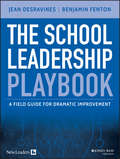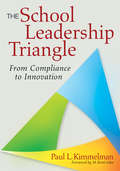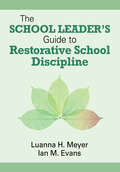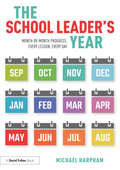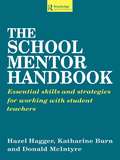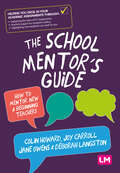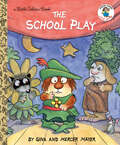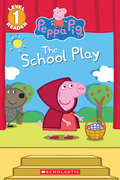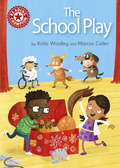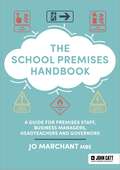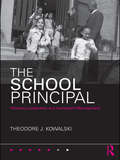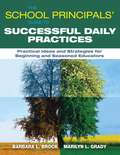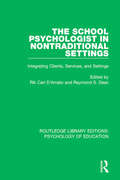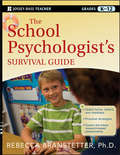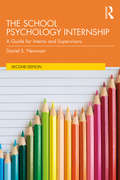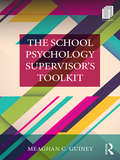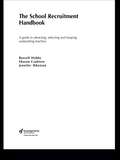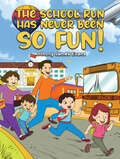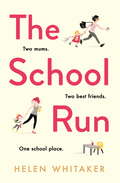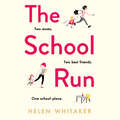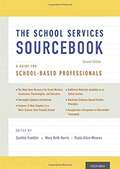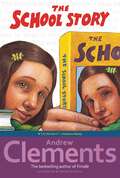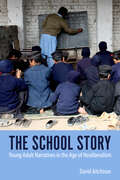- Table View
- List View
The School Leadership Playbook: A Field Guide for Dramatic Improvement
by Jean Desravines Benjamin FentonA proven framework for whole-school improvement The School Leadership Playbook is a practical guide for education leaders looking to push their school's and students' achievement to the next level. Developed by renowned leadership preparation program New Leaders, the Transformational Leadership Framework focuses on the five categories that drive a school's success: Learning and Teaching, School Culture, Talent Management, Operations and Systems, and Personal Leadership. This book illustrates how each of these factors contributes to breakthrough gains, and outlines a plan for implementing changes in your own school. You'll learn how to accurately diagnose the current state of your school's academics and culture and create an action plan for the year ahead. The TLF is grounded in the latest research and case studies of the highest-gaining turnaround schools, and shows you the specific actions you can take to attract, retain, and support high-performing teachers; improve school culture; successfully involve parents and the community; and ultimately drive student success. New Leaders developed the UEF to pinpoint what schools achieving significant student academic gains were doing, and how they were doing it. This book provides a practical breakdown of the framework to help you begin leading these changes in your own school. Ensure rigorous goal- and data-driven teaching and learning Build and manage a high-performance faculty aligned to the school's vision Implement effective and efficient operations and systems Model the tone you would like to see from students and teachers school-wide By matching the needs of the school to effective principal actions and school practices, leaders can create a plan for transformational change.
The School Leadership Triangle: From Compliance to Innovation
by Paul L. KimmelmanThe author's triangular framework based on federal policy compliance, effective leadership, and innovation helps schools and districts achieve continuous improvement in the 21st century.
The School Leader’s Guide to Restorative School Discipline
by Professor Luanna H. Meyer Dr William John EvansA positive model for restorative discipline The authors provide a research-based and field-tested model that gives school leaders more productive alternatives to punishment, exclusion, and out-of-school suspension. This positive program helps improve behavior and keep students in school. This guide’s model covers school-wide prevention, restoration, and intervention needs for students with emotional, behavioral, and conduct disorders (such as bullying) as well as developmental disabilities and autism. Key topics include: The latest research on the effectiveness of restorative discipline How to implement a comprehensive, school-wide discipline plan Ways to support and sustain the plan with teacher teams Networking with community services such as child protection, child welfare, juvenile justice, and mental health professionals
The School Leader’s Year: Month-by-Month Progress, Every Lesson, Every Day
by Michael HarphamThis practical handbook offers a month-by-month guide to the curriculum, assessment, progress, and leadership over the school year. It provides a clear, comprehensive, and coherent structure to the academic year helping school leaders to prioritise their time and workload, supporting them and their team to work as efficiently and effectively as possible. Considering the statutory and key leadership activities from admissions, induction, transitions, and parents’ evenings to coursework, timetabling, assessment, staff performance, and much more, the book provides a clear plan of action to ensure school leaders have prepared their work at the optimal time over the year. Each chapter features tried-and-tested strategies to help schools put robust systems and processes in place alongside guidance on sustaining pace, developing resilience, and exam preparation and technique. Full of practical tips to help improve progress and including real-world examples of leadership in action from leaders working in primary and secondary schools, this is essential reading for all school leaders that want their students to be as successful as they can possibly be in every lesson, every day.
The School Mentor Handbook: Essential Skills and Strategies for Working with Student Teachers
by Burn, Katherine Hagger, Hazel McIntyre, DonaldThis manual offers practical guidelines for mentors working with student teachers, based on the authors' experience within the Oxford Internship Scheme. It consists of materials that have been used on the pilot scheme, each of which is evaluated in light of the authors' success with them.
The School Mentor’s Guide: How to mentor new and beginning teachers
by Joy Carroll Colin Howard Jane Owens Deborah LangstonThe ultimate guide for current and aspiring school mentors. Whether you are a recently qualified teacher who has taken on their first mentee or are a professional mentor who is responsible for groups of trainees and teachers in the early years of their careers, this book explores what effective mentoring is and how to succeed in your role. The book: · Provides a framework for you as a school-based mentors to work within. · Outlines the key skills and qualities of effective in-school mentors. · Supports you in building confidence and raising the status of your role. · Brings greater coherence and consistency to school-based mentoring for trainee and beginning teachers.
The School Mentor’s Guide: How to mentor new and beginning teachers
by Joy Carroll Colin Howard Jane Owens Deborah LangstonThe ultimate guide for current and aspiring school mentors. Whether you are a recently qualified teacher who has taken on their first mentee or are a professional mentor who is responsible for groups of trainees and teachers in the early years of their careers, this book explores what effective mentoring is and how to succeed in your role. The book: · Provides a framework for you as a school-based mentors to work within. · Outlines the key skills and qualities of effective in-school mentors. · Supports you in building confidence and raising the status of your role. · Brings greater coherence and consistency to school-based mentoring for trainee and beginning teachers.
The School Play (Little Golden Book)
by Mercer MayerLittle Critter gets a part in the school play in this classic Little Golden Book!Little Critter and his classmates are excited about putting on a school play for their family and friends! Children ages two to five will enjoy this heartwarming full-color Little Golden Book, first published in 1995!
The School Play Ebk (Peppa Pig)
by Meredith Rusu<P>Peppa Pig's class is putting on a school play! Peppa stars as Little Red Riding Hood and Danny Dog is the Big Bad Wolf. Pedro Pony is the hunter -- but he's very shy. Will all of the children remember their lines and make the play a big success? Find out in this Level 1 reader with stickers! <P>Based on the hit television show, as seen on Nick Jr.
The School Play: Independent Reading Red 2 (Reading Champion #367)
by Katie WoolleyLil and Tim are having trouble choosing an outfit for the school play ... what will they be?Reading Champion offers independent reading books for children to practise and reinforce their developing reading skills.Fantastic, original stories are accompanied by engaging artwork and a reading activity. Each book has been carefully graded so that it can be matched to a child's reading ability, encouraging reading for pleasure. Perfect for the 4-5 year old beginner reader or those reading book band red.
The School Premises Handbook: a guide for premises staff, business managers, headteachers and governors
by Jo MarchantA handbook to inform school premises staff, business managers, headteachers and governors in England of their legal responsibilities around buildings compliance. As well as exploring the impact of school buildings and grounds on student learning, The School Premises Handbook covers the working environment, fire safety, health and safety, statutory compliance duties, planning for maintenance, risk assessments, energy efficiency, environmental sustainability, and managing and developing a premises team. Jo Marchant, a highly experienced head of estates, introduces key legislation, further information sources, and an action checklist. New premises staff will find a wealth of information, from what to do on their first day in the role to planning the year-long cycle of maintenance activities. More experienced premises staff will also gain plenty of useful insights. School business managers will find advice on managing premises staff and developing their school estate. Headteachers will be informed of their responsibilities for ensuring their schools are safe and compliant. And governors and trustees will learn how to hold school leadership to account.
The School Premises Handbook: a guide for premises staff, business managers, headteachers and governors
by Jo MarchantA handbook to inform school premises staff, business managers, headteachers and governors in England of their legal responsibilities around buildings compliance. As well as exploring the impact of school buildings and grounds on student learning, The School Premises Handbook covers the working environment, fire safety, health and safety, statutory compliance duties, planning for maintenance, risk assessments, energy efficiency, environmental sustainability, and managing and developing a premises team. Jo Marchant, a highly experienced head of estates, introduces key legislation, further information sources, and an action checklist. New premises staff will find a wealth of information, from what to do on their first day in the role to planning the year-long cycle of maintenance activities. More experienced premises staff will also gain plenty of useful insights. School business managers will find advice on managing premises staff and developing their school estate. Headteachers will be informed of their responsibilities for ensuring their schools are safe and compliant. And governors and trustees will learn how to hold school leadership to account.
The School Principal: Visionary Leadership and Competent Management
by Theodore J. KowalskiOver the past two decades, efforts to improve schools have significantly modified role expectations for principals. Today, school-level administrators are expected to be both visionary leaders and competent managers. Based on the conviction that administration is an amalgam of leadership and management, The School Principal emphasizes the need for practitioners to apply conceptual skills to make "what to do" decisions, to apply technical skills to make "how to do" decisions, and to apply relational skills to engage in democratic decision making. Kowalski frames the book with a discussion of the nature of schools, the roles of principals, and their need to improve schools. The book then provides a balanced treatment of leadership and management, covering issues of personal behavior, instructional leadership, relationship building issues, finances, facilities, personnel management, pupil services, and maintaining safe schools. The text closes with discussion of the vital aspects of practice for contemporary principals, addressing problem solving, collaborative change strategies, and personal commitment to being a principal. Special Features: Vignettes introduce the subject matter in the context of common challenges faced by practitioners. Knowledge-Based Questions and Skill-Based Activities prompt readers to engage with and reflect on the chapter content. The School Principal aligns with the Educational Leadership Consortium Council (ELCC) Standards. Treating principals as concurrently visionary leaders and competent managers, this excellent text addresses the needs of aspiring and practicing principals, providing the tools to build effective and efficient schools.
The School Principals' Guide to Successful Daily Practices: Practical Ideas and Strategies for Beginning and Seasoned Educators
by Marilyn L. Grady Barbara L. BrockWhile many books outline the attributes of successful school leaders, few describe how those traits manifest in daily practice. The Daily Practices of Successful Principals goes beyond the outward picture of excellence and provides a compendium of daily practices used by successful principals in various settings. Written by former administrators who have walked in your shoes, this handy guide's strategies are based on interviews with successful leaders and are applicable in multiple contexts. Inside you will find guidelines for: Examining your values, educational platform, and personal style Establishing learning as a common purpose Identifying and leading school change Managing staff and student relationships effectively Developing teacher leadersThe authors understand that principals are expected to have the patience of Job, the tenacity of Atlas, the compassion of Mother Teresa, and a sense of humor. The recommended daily practices will help you stay focused on the most important things-leading effectively, promoting student achievement, and making a positive difference in students' lives.
The School Psychologist in Nontraditional Settings: Integrating Clients, Services, and Settings (Routledge Library Editions: Psychology of Education)
by Rik Carl D’Amato Raymond S. DeanOriginally published in 1989, school psychology, according to the contributors of this unique volume, is an approach to problem solving, not simply a setting- specific profession. Following Lightner Witmer's original notion, the editors lay a foundation for the field of school psychology in "nontraditional" settings. Such nontraditional practice stems from data showing that school psychologists display skills and abilities that can be applied successfully to a variety of client needs in numerous settings. This special book directly affects both the practicing school psychologist and those in training, as well as professionals and students in clinical child psychology, counseling, and educational psychology.
The School Psychologist's Survival Guide (J-B Ed: Survival Guides #174)
by Rebecca BranstetterA practical and accessible guide for helping school psychologists meet their everyday challenges In this newest addition to the Jossey-Bass "Survival Guide" series, popular blogger Rebecca Branstetter offers help for school psychologists who must often travel to multiple school sites, deal with students with severe disabilities, meet with concerned parents, and manage school crises. The book is filled with practical advice, proven strategies, and useful tools, complete with reproducible forms, letters, and checklists for busy professionals. Filled with the tools, strategies, and ideas for school psychologists who must deal with the myriad challenges of working with a diverse group of students, often in multiple locations Another book in the popular Jossey-Bass "Survival Guide" Series Rebecca Branstetter is an experienced school psychologist and popular blogger ("Notes from the School Psychologist": studentsgrow. blogspot. com) This vital resource offers a down-to-earth guide for both novice and seasoned school psychologists.
The School Psychology Internship: A Guide for Interns and Supervisors
by Daniel S. NewmanThe School Psychology Internship is intended to support both doctoral and graduate-level interns and their supervisors (both field and university) in navigating the internship process. Emphasis is placed on the idea that the internship year is a dynamic and formative journey and that interns and supervisors both must be active planners, coordinators, and shapers of the experience. This thoroughly updated 2nd Edition contains an array of helpful resources such as evaluation tools, best practice guidelines, added coverage on doctoral-level training, and sample forms along with all new supplementary materials designed to aid interns in the transition from internship to early career practice.
The School Psychology Supervisor’s Toolkit (Consultation, Supervision, and Professional Learning in School Psychology Series)
by Meaghan C. GuineyThe School Psychology Supervisor’s Toolkit provides accessible, adaptable strategies for supervising school psychologists at all points in the career span, from internship to advanced practice. The book covers a full range of key considerations for effective supervision, such as building strong working relationships, planning the supervision experience, providing constructive feedback, and addressing problems of professional competence. Features such as definitions of key terms, photocopiable handouts, tips for culturally responsive practice, and real-life case examples make this a rich and easily applied resource.
The School Recruitment Handbook: A Guide to Attracting, Selecting and Keeping Outstanding Teachers
by Sharon Crabtree Russell Hobby Jennifer IbbetsonGood teachers are distinguished by their characteristics - passion, integrity, initiative, confidence and more - yet recruitment tends to focus on skills and knowledge. Skills are vital, but are not the whole picture. This handbook provides a comprehensive technique for spotting and assessing the deeper characteristics of outstanding teachers during interview, using the Hay McBer research into effective teaching. Spotting an outstanding teacher, however, is wasted if they are not attracted to the school. Included in this guide is a means of evaluating, improving and communicating a school's attractiveness to candidates and existing staff. Providing a pathway through the complex recruitment process - from defining the school's needs to welcoming the new recruit into the school - this book includes: research into teacher effectiveness critical incident interviews definition and attraction assessment induction. Presenting surveys, original research into effective teaching, and interviews with recruiters and recruits, this lively guide offers practical advice for all schools.
The School Run Has Never Been So Fun!
by Anthony James EvansEvery morning, millions of families navigate the chaos of the school run. But for the Twinklenight family, it’s anything but ordinary. Embark on a whimsical ride with them as they tackle unexpected adventures and delightful detours, all while racing against the clock to reach those gleaming school gates. Join the Twinklenights and discover why their school run is unlike any other!
The School Run: A laugh-out-loud novel full of humour and heart
by Helen Whitaker'Funny and frank' DAWN O'PORTERTwo mothers. Two daughters. One school place.Imogen and Lily are old friends - they've shared hangovers, unsuitable boyfriends and wild nights out together. But now they're mums, and their partying days are behind them. When a place comes up at one of the best primary schools in the area, both women want it for their daughters. From faking religious beliefs to bogus break-ups, Imogen and Lily will go to any lengths to secure the perfect school for their children - and so will all the other mothers.Will their friendship survive the strain? Will their marriages take the pressure? And when a sexy new vicar arrives on the scene, will the mothers' keep focus for long enough to keep their eyes on the prize?A hilarious, heartwarming read, perfect for fans of Sophie Kinsella and Fiona Gibson.
The School Run: A laugh-out-loud novel full of humour and heart
by Helen WhitakerTwo mothers. Two daughters. One school place.Imogen and Lily are old friends - they've shared hangovers, unsuitable boyfriends and wild nights out together. But now they're mums, and their partying days are behind them. When a place comes up at one of the best primary schools in the area, both women want it for their daughters. From faking religious beliefs to bogus break-ups, Imogen and Lily will go to any lengths to secure the perfect school for their children - and so will all the other mothers.Will their friendship survive the strain? Will their marriages take the pressure? And when a sexy new vicar arrives on the scene, will the mothers' keep focus for long enough to keep their eyes on the prize?A hilarious, heartwarming read, perfect for fans of Sophie Kinsella and Fiona Gibson.
The School Services Sourcebook, Second Edition: A Guide For School-based Professionals
by Cynthia Franklin Paula Allen-Meares Mary Beth HarrisThe School Services Sourcebook covers every aspect of school service delivery, arming practitioners with the nuts and bolts of evidence-based practice. The second edition has been significantly revised with a new structure including 73 chapters divided into five Parts across thirteen Sections, with an additional six chapters included in an online section found on the book's companion website. Fifteen new chapters cover key topics such as implementing an RTI framework, positive behavioral supports, school climate, functional behavioral assessment, the integration of ethics, Autism and suicide, school engagement, military families, Latino immigrant families, classroom management, transition planning and several chapters that speak to assessment and accountability. Each chapter serves as a detailed intervention map, quickly summarizing the problem area before presenting step-by-step instructions on how to implement an evidence-based program with clear goals in mind and methods to measure the outcome. The concise, user-friendly format from the first edition has been retained, orienting readers to each issue with a Getting Started section, then moves smoothly into What We Know, What We Can Do, Tools and Practice Examples, and Key Points to Remember. A new section, Applying Interventions within Response-to-Intervention Framework, has been added to each chapter to facilitate the implementation of an RTI model. Quick-reference tables and charts highlight the most important information needed for daily reference, and annotated lists of further reading and Web resources guide readers in gathering additional information to tailor their practice to suit their students' needs. Each chapter has been specifically crafted by leaders in their fields with the ultimate goal of giving school-based practitioners the tools they need to deliver the best mental health and social services possible to students, families, and communities. This sourcebook is an invaluable reference for all school-based social workers, psychologists, counselors, mental health professionals, educators, and administrators.
The School Story
by Andrew ClementsTwelve-year-old Natalie Nelson has written a powerful school story. It's a short novel called "The Cheater," and her best friend Zoe is certain it should be published. All Natalie has to do is give the manuscript to her mom, an editor at a big publishing house. However Natalie doesn't want any favors from her mom. Still, Zoe won't drop the idea. Spurred into action, Natalie invents a pen name for herself and Zoe becomes a self-styled literary agent. But if the girls are to succeed, they'll need support from their wary English teacher, legal advice from Zoe's tough-talking father, and some clever maneuvering to outwit the overbearing editor in chief of Shipley Junior Books. Andrew Clements, the best-selling author of Frindle, The Landry News, and The Janitor's Boy, delights his audience with this story of two irrepressible girls who use their talent, ingenuity, and a little cunning to try to make a young writer's dream come true.
The School Story: Young Adult Narratives in the Age of Neoliberalism (Children's Literature Association Series)
by David AitchisonThe School Story: Young Adult Narratives in the Age of Neoliberalism examines the work of contemporary writers, filmmakers, and critics who, reflecting on the realm of school experience, help to shape dominant ideas of school. The creations discussed are mostly stories for children and young adults. David Aitchison looks at serious novels for teens including Laurie Halse Anderson’s Speak and Faiza Guène’s Kiffe Kiffe Tomorrow, the light-hearted, middle-grade fiction of Andrew Clements and Tommy Greenwald, and Malala Yousafzai’s autobiography for young readers, I Am Malala. He also responds to stories that take young people as their primary subjects in such novels as Sapphire’s Push and films including Battle Royale and Cooties. Though ranging widely in their accounts of young life, such stories betray a mounting sense of crisis in education around the world, especially in terms of equity (the extent to which students from diverse backgrounds have fair chances of receiving quality education) and empowerment (the extent to which diverse students are encouraged to gain strength, confidence, and selfhood as learners). Drawing particular attention to the influence of neoliberal initiatives on school experience, this book considers what it means when learning and success are measured more and more by entrepreneurship, competitive individualism, and marketplace gains. Attentive to the ways in which power structures, institutional routines, school spaces, and social relations operate in the contemporary school story, The School Story offers provocative insights into a genre that speaks profoundly to the increasingly precarious position of education in the twenty-first century.
